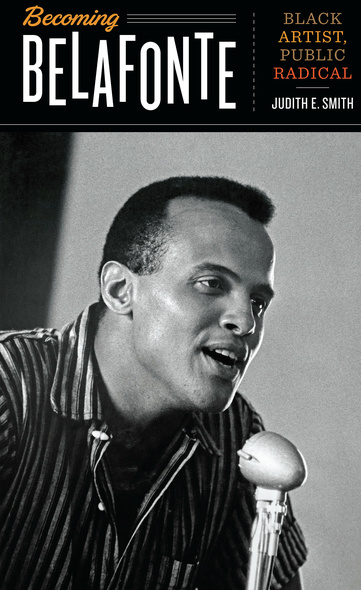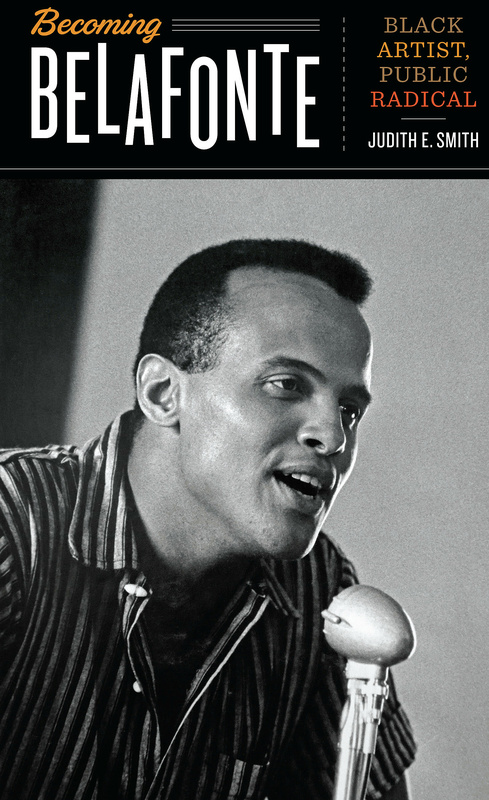Becoming Belafonte
Black Artist, Public Radical
A son of poor Jamaican immigrants who grew up in Depression-era Harlem, Harry Belafonte became the first black performer to gain artistic control over the representation of African Americans in commercial television and film. Forging connections with an astonishing array of consequential players on the American scene in the decades following World War II—from Paul Robeson to Ed Sullivan, John Kennedy to Stokely Carmichael—Belafonte established his place in American culture as a hugely popular singer, matinee idol, internationalist, and champion of civil rights, black pride, and black power.
In Becoming Belafonte, Judith E. Smith presents the first full-length interpretive study of this multitalented artist. She sets Belafonte’s compelling story within a history of American race relations, black theater and film history, McCarthy-era hysteria, and the challenges of introducing multifaceted black culture in a moment of expanding media possibilities and constrained political expression. Smith traces Belafonte’s roots in the radical politics of the 1940s, his careful negotiation of the complex challenges of the Cold War 1950s, and his full flowering as a civil rights advocate and internationally acclaimed performer in the 1960s. In Smith’s account, Belafonte emerges as a relentless activist, a questing intellectual, and a tireless organizer. From his first national successes as a singer of Calypso-inflected songs to the dedication he brought to producing challenging material on television and film regardless of its commercial potential, Belafonte stands as a singular figure in American cultural history—a performer who never shied away from the dangerous crossroads where art and politics meet.
So engaging that readers will crave a sequel.
The book’s considerable strength is Smith’s careful depiction of the decisions and constraints Belafonte faced as a powerful cultural figure...Becoming Belafonte is a well-written, industriously researched study that is a valuable contribution to the historiography of both the black freedom struggle and popular culture in the pivotal postwar years.
Judith Smith enhances our roadmap of the long civil rights era, charting the formation and rise of a renewed civil rights ‘public’ out of the scorched earth of the McCarthy era. Far more than a biography of Harry Belafonte as both activist and artist, Becoming Belafonte documents a web of critical collaborative relationships and the tight alignment of progressive cultural production and anti-racist activism from the Popular Front through the 1960s in theater, film, music, and, later, television. A rich, compelling, important book.
I thought I knew Harry Belafonte pretty well, but Judith Smith’s book has given me deeper insights into him. A wonderful portrait of Belafonte and his times.
This is the book I’ve been waiting for: a penetrating, revelatory account of how this Harlem-born child of Jamaican immigrants became Harry Belafonte, the multiply talented singer, actor, and radical activist. Judith Smith brilliantly reveals all facets of the man, devoting as much attention to his original musical contributions and dramatic training as his political work. From her rich portrait of Harlem’s cultural milieu to the exigencies of the Black Freedom movement, Smith embeds Belafonte firmly within the world that made him, delivering a fresh and original perspective on the man, the artist, and the citizen.
- Acknowledgments
- Introduction
- Chapter 1. From Harlem, Jamaica, and the Segregated Navy to New York City's Interracial Left-Wing Culture, 1927–1948
- Chapter 2. Black Left, White Stage, Cold War: Moving into the Spotlight, 1949–1954
- Chapter 3. Multimedia Stardom and the Struggle for Racial Equality, 1955–1960
- Chapter 4. Storming the Gates: Producing Film and Television, 1957–1970
- Afterword
- Abbreviations for Notes
- Notes
- Index






